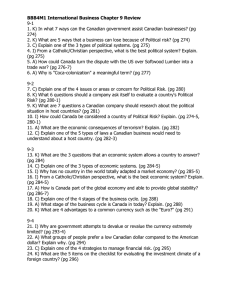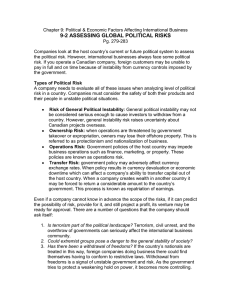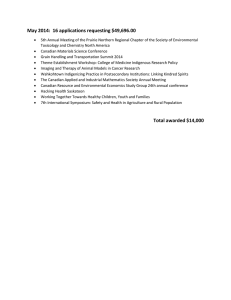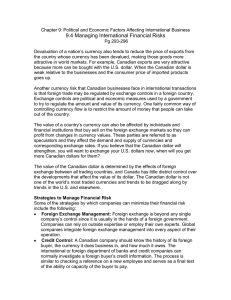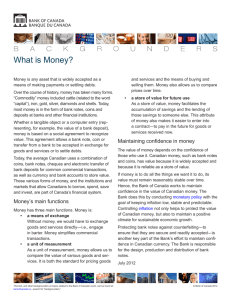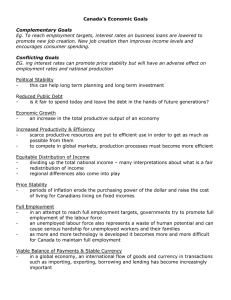1 THE POLITICAL PROCESS: GOVERNMENT’S ROLE IN 9- INTERNATIONAL TRADE
advertisement
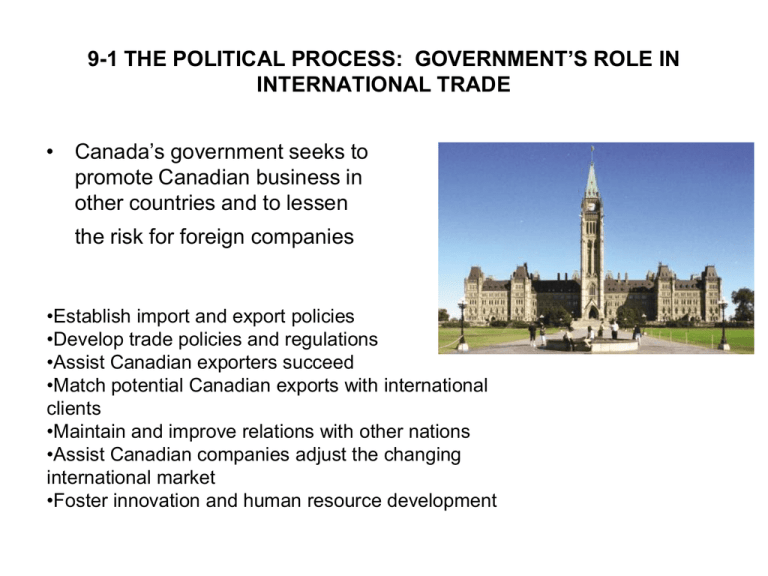
9-1 THE POLITICAL PROCESS: GOVERNMENT’S ROLE IN INTERNATIONAL TRADE • Canada’s government seeks to promote Canadian business in other countries and to lessen the risk for foreign companies •Establish import and export policies •Develop trade policies and regulations •Assist Canadian exporters succeed •Match potential Canadian exports with international clients •Maintain and improve relations with other nations •Assist Canadian companies adjust the changing international market •Foster innovation and human resource development • In most countries Canada has an embassy, high commission or trade consulate and is run by the ambassador or trade commissioner • promote and encourage safe and friendly trade. • establish and manage relationships, • look after our interests and assist Canadians living there • help coordinate work permits and visas. Political Risk • Political risk may lead to losses including: financial losses, time delays, technical breakdowns, loss of reputation, or loss of market share. • Political risk analysis looks for the causes of risk and predicts the effect it would have on investment in that country. • Awareness is the first step. • Risk management requires assessing potential political situation. The assessment is factored into business decisions for that country. • Political risk occurs when government policies threaten the business environment. • Economic risks include policies and controls to affect price and currency rate. Policies may change at anytime. • Businesses may walk away from opportunities because of the risk. Ways to minimize the risk: 1. take out insurance, 2. balance with more secure projects or 3. build in higher prices for products in the country Types of Political Systems • DEMOCRACY - The general population has the right to vote in free elections. Individuals may own property and run businesses and have free press and free speech. Most have a market or capitalist economy. • TOTALITARIAN systems (North Korea, Cuba, Myanmar) centralize power and often use military control. Governments are single party or a dictatorship. Citizens have little say in the governing. Most have a command economy. • In reality most countries have a mixed system of government. Most countries also have a mixed economy, having elements of both market and command economies. • Recent political events have changed Russia (formerly Communist) and China (still communist) and have created more open markets and trade. Even Canada’s trade with Communist Cuba has increased. Doing business with countries in political transition is risky because of the instability of political, economic and social institutions. Political Interdependence • • • • • • • • Canada prefers to deal with democratic countries, but important opportunities exist in non-democratic countries (China). When a trade war occurs countries will act aggressively in international markets and other areas to promote their own trading interests. In 2001 Canada banned Brazilian beef officially because of mad cow disease, but it was suspected it was because of the sale and subsidy of Canadian and Brazilian-made aircraft. Grocery stores and transportation companies lost business in the crossfire. Interdependence also happens because of economic imperialism. A less-developed country can address the needs for a developed country by providing raw materials and markets. In “Coca-Colonization” powerful multinationals can exert considerable economic and cultural power over local people. Today, pressure groups and populist movements demonstrate against this and protest against the WTO. CHINA TRADE WAR 9-2 ASSESSING GLOBAL POLITICAL RISKS • Companies look at the host country’s current or future political system to assess the political risk. • However, international businesses always face some political risk. • If you operate a Canadian company, foreign customers may be unable to pay in full and on time because of instability from currency controls imposed by the government. Types of Political Risk • Risk of General Political Instability: may not be considered serious enough to cause investors to withdraw from a country. However it raises uncertainty about Canadian projects overseas. • Ownership Risk: when operations are threatened by government takeover or expropriation, owners may lose their offshore property. This is referred to as protectionism and nationalization of business. • Operations Risk: Government policies of the host country may impede business operations such as finance, marketing, or property. • Transfer Risk: government policy may adversely affect currency exchange rates. • When policy results in currency devaluation or economic downtime which can affect a company’s ability to transfer capital out of the host country. • When a company creates wealth in another country it may be forced to return a considerable amount to the country’s government. This process is known as repatriation of earnings. Questions a company should ask when considering political risk • Is terrorism part of the political landscape? Terrorism, civil unrest, and the overthrow of governments can seriously affect the international business community. • Could extremist groups pose a danger to the general stability of society? • Has there been a withdrawal of freedoms? If the country’s nationals are treated in this way, foreign companies doing business there could find themselves having to conform to restrictive laws. Withdrawal from freedoms is a signal of unstable government and risk. As the government tries to protect a weakening hold on power, it becomes more controlling. • What, if any, is the military’s role in government? If it is in power, how firm is its grasp on power? Is corruption part of the business ethic? Could a company find itself having to make higher and higher payments to officials? Could religious or ethnic pressures lead to civil strife and endanger employees or property? • • Evaluating Political Risks • What are the chances of political and economic instability in the host country over the next five years? • What agreements are in place between the Canadian government and the host government regarding Canadian investments? • How committed is the current government to the rules of ownership rights? • When is the next election or how long will the current government stay in place? • If a new government were to emerge, how would its platform and ideology change the current state of business affairs? • Would a new government be likely to propose changes in policies that would affect the country’s way of doing international business? • How would changes in government affect the profitability and safety of an international project? Consequences of Terrorism • Terrorism tends to occur when least expected and becomes a greater concern when open borders make it easier for terrorists to carry out their plans. • When a terrorist attack takes place it not only instills fear into people but it also has many other negative consequences on a countries economy and its businesses such as transportation, security and travel. Evaluating Legal Concerns • Laws and regulations differ from one country to the next. When doing business in a foreign country, you must obey the laws from that country make work safe for workers. • They may make costs greater for business. 9.3 Economic Factors Related to International Business • Economic Systems • • • • An economic system is what allows a country to decide what to produce, how to produce, and for whom to produce. These systems include natural resources, labor, capital, management and standards for creating products 9.3 Economic Factors Related to International Business • • • • • • • • • • • • • • • • • Economic Systems An economic system is what allows a country to decide what to produce, how to produce, and for whom to produce. These systems include natural resources, labor, capital, management and standards for creating products. Market Economies In market economies, i) ownership of private property is encouraged, ii) businesses are encouraged to produce better products, iii) competition is encouraged because it can create better quality and lower prices, iv) the Government has little direct involvement with the business itself, and v) self-sufficiency is not seen as an economic goal. Supply and demand control market economies. The “law” of supply states that as the price of a product increases, producers will be willing to make more of that product. The “law” of demand states that as the price of a product increases consumers will demand less of that product. Producers must find the equilibrium point which is the point at which the consumers are willing to pay the asking price and the company still makes a profit. Centrally Planned Economies In centrally planned economies the government controls the ownership of private property. By having more government control the profit motive is not the main goal of the business. There are fewer pure centrally planned economies following the collapse of communism in the former Soviet Union. Mixed Economies A mixed economy includes government involvement and private ownership of businesses. In some countries, the government owns the transportation and communication businesses. In socialist mixed economies, most of the main industries are government controlled, but citizens are free to work in other industries. Canada has a mixed economy. Because Canada has a large, land mass and a relatively small population, the Canadian government has to play a major role in our important industries. Sweden, Italy, and Australia have also adopted mixed economy systems. Governments privatize state owned enterprises. Privatization may occur when a country moves from a centrally planned to a market economy, it can also happen in mixed economies. As a countries economic system matures, it tends to move towards a market system. When a centrally planned economy shifts to a market economy, the price of some products rise, there is more competition, and there may be greater unemployment. Global Economic Systems Since no nation can be completely self sufficient, they must trade with others (interdependence). Economic growth increases economic stability and brings the nation confidence as well as the ability to invest in the future. The global economy reflects the total amount of interdependent economic activity around the globe. In the past, the government would set rules on economic policies, but now the world is becoming one big market and trade barriers are beginning to slack. Global economy provides countries with more jobs and a higher standard of living. Countries use different strategies such as clustering (joining together in their industries) to get into the new economic order. Business Cycles • Business cycles are patterned movements in the economy measured by the growth of production and industries • PHASES 1) Depression (slowest economy) 2) Recovery (improving economy) 3) Prosperity (good economy) 4) Recession (economy begins to slow) The World Economic Freedom Index • Businesses must be aware of the economic freedom rating • A measure of prosperity that relates to economic growth, per capita income, and material wealth, calculated according to the level of market and trade freedoms a country has • “The Economic Freedom of the World” measures the following factors: • size of government • international exchange • Monetary policy and price stability • economy structure & use of markets • freedom to use alternative currencies • freedom of exchange in capital & financial markets • legal structure and property rights • *See pg 289 for current and past global economic freedom ratings Canada’s Global Entrepreneurs Around-the-Clock World Markets Common Currency 9.4 Managing International Financial Risks • • • • Devaluation of a nation’s currency reduces the price of exports from the country whose currency has been devalued, making those goods more attractive in world markets. For example, Canadian exports are very attractive because more can be bought with the U.S. dollar. When the Canadian dollar is weak relative to the businesses and the consumer price of imported products goes up. Another currency risk that Canadian businesses face in international transactions is that foreign trade may be regulated by exchange controls in a foreign country. Exchange controls are political and economic measures used by a government to try to regulate the amount and value of its currency. One fairly common way of controlling currency flow is to restrict the amount of money that people can take out of the country. The value of a country’s currency can also be affected by individuals and financial institutions that buy sell on the foreign exchange markets so they can profit from changes in currency values. These parties are referred to as speculators and they affect the demand and supply of currencies and corresponding exchange rates. If you believe that the Canadian dollar will strengthen, you will want to exchange your U.S. dollars now, when will you get more Canadian dollars for them? The value of the Canadian dollar is determined by the effects of foreign exchange between all trading countries, and Canada has little district control over the developments that affect the value of its dollar. The Canadian dollar is not one of the world’s most traded currencies and trends to be dragged along by trends in the U.S. and elsewhere. Strategies to Manage Financial Risk • • • • • Some of the strategies by which companies can minimize their financial risk include the following: Foreign Exchange Management: Foreign exchange is beyond any single company’s control since it is usually in the hands of a foreign government. Companies can rely on outside expertise or employ their own experts. Global companies integrate foreign exchange management into every aspect of their operation. Credit Control: A Canadian company should know the history of its foreign buyer, the currency it does business in, and how much it owes. The international or foreign department of banks and credit companies can normally investigate a foreign buyer’s credit information. The process is similar to checking a reference on a new employee and serves as a final test of the ability or capacity of the buyer to pay. Open Accounts: Open accounts can also be used to reduce financial risk. An open account is an agreement between the two companies that future shipments of a product will be stopped if payment is not made. An open account might cause problems if the order is rather large and expensive, because the exporting company could face added risk by not being paid on time. Insurance: A company also has the option of purchasing insurance to cover nonpayment of international invoices. If this happens, the exporter receives a majority of its invoiced amount from the insurer. With this kind of insurance in place, companies might feel more secure operating in an open account. Analyzing Foreign Investment Climates • Companies invest in other countries to obtain raw materials, acquire products at a lower cost, and enter local markets. A company usually decides to invest in a country after it has had success in export. • International business investors need to research and analyze potential foreign investments carefully. A checklist for evaluating the investment climate: • General political stability: Form of government, rivalries and conflicts present, past political climate. • Government policies towards foreign investment: Trade agreements and attitudes. • Policies and legal factors: Labour laws, honesty of public officials, and taxation on profits. • Economic environment: Per capita income, infrastructure, and economy. • International payments: Exchange rate.
